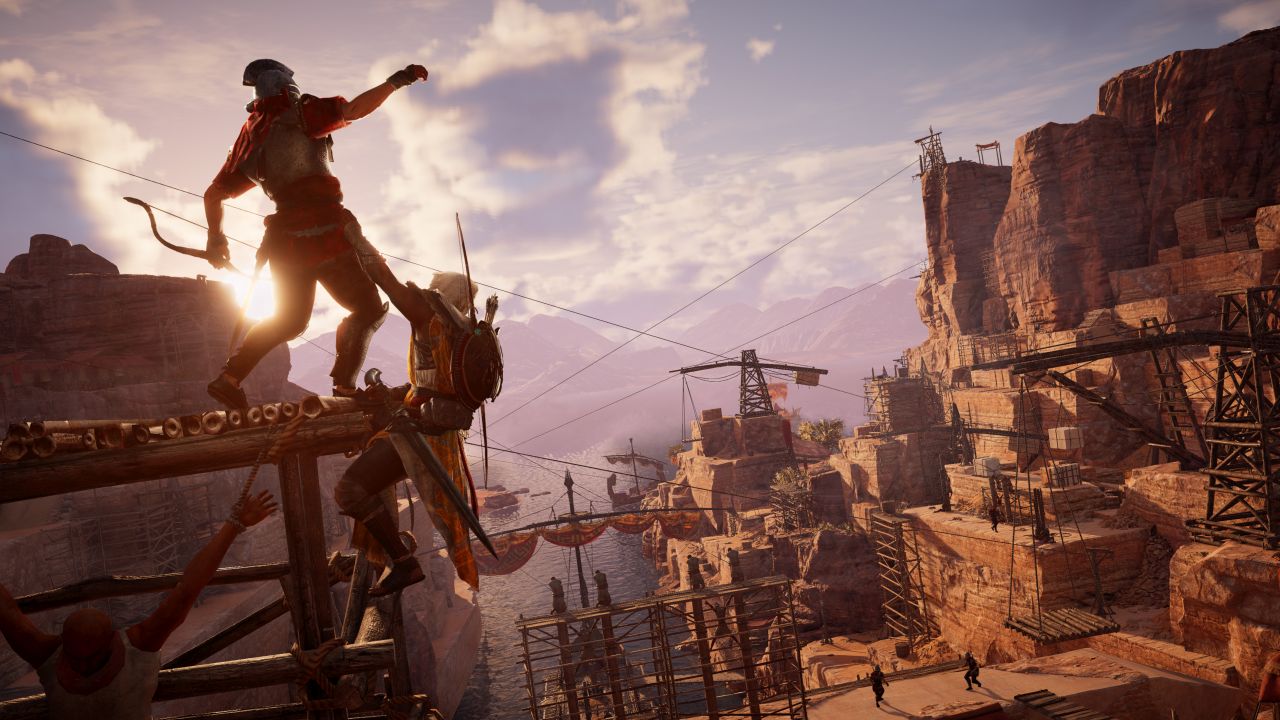‘Assassin’s Creed: Origins’ Is the First, Much Needed Reboot of the Series
Credit to Author: Matthew Gault| Date: Thu, 26 Oct 2017 11:00:00 +0000
I love Assassin’s Creed. From the moment Altaïr Ibn-La’Ahad—the original game’s hero—uttered “nothing is true, everything is permitted,” I was hooked. As a fan of weird conspiracy theories and beat writer William S. Burroughs, the original Assassin’s Creed felt as if the developers had made the game just for me.
But my love has faltered over the years. Assassin’s Creed: Unity—set in Paris during the French Revolution—was a beautiful mess, Assassin’s Creed: Syndicate—set in London at the turn of the 19th century—was functional but boring, and Michael Fassbender’s Assassin’s Creed movie was the dullest, most expensive commercial ever made. The series became a victim of its own success. Each entry made tens of millions of dollars and publisher Ubisoft released a new one every year. Like Call of Duty, this led to a string of interchangeable, boring, and repetitive sequels.
The brilliant hook for the franchise, which follows an eternal battle between the Assassins and Templar factions, was that each game could take players to a radically different place. It started in Jerusalem during the Third Crusade, then took players to Renaissance Italy, revolutionary America, and so on. Ironically, for a series that promised infinite variety, it became incredibly rote. The backdrop was different, but playing it was always the same: climb a tower, stab the dude. Same shit, different century.
Assassin’s Creed: Origins is the best the series has felt since Ezio Auditore da Firenze charmed players in Assassin’s Creed II because it actually, finally, makes a leap of faith. It doesn’t all work, and its first hour—a crucial period for any game to grab players—is messy, but at least it’s trying something different for the first time. Origins stole the best features of its competition, completely reworked combat, and finally delivered on the promise of dynamic assassination missions.
Origins takes players to Ptolemaic Egypt right before the Roman conquest around 30 BCE. It’s a fight between two occupying empires, with the hero Bayek and the people of Egypt caught in the middle. Assassin’s Creed’s themes of order vs chaos, control vs freedom, resonate well against this backdrop.
The change you’ll notice the most is in the main activity in all Assassin’s Creed games: stabbing people. Combat in every previous game relied on simple, easy to execute timed attacks, which turned into button mashing. A decent player could kill a mob with their eyes closed. Not so in Origins. Bayek locks onto a single target, uses a shield, and dodges telegraphed attacks. It at least required me to pay attention.
Maybe that’s because the AI is much better this time around too. I’ve had guards pull back from a poorly timed assassination. If I’m crouched in the bushes, whistle to bring over a guard, and don’t time the kill just right, they will see me and and attack. Even during combat, they’re smarter. Ranged units stick and move, firing off an arrow before changing position. I even had one ranged guard charge me directly with his bow drawn.
So far, the assassination missions have been the best change in Origins. For a series with “assassin” in the title, it rarely asked the player to scheme or act like an assassin. It offered the illusion of choice but, in reality, gave the player a list of boxes to tick on the way to a murder cutscene. It felt like an open world game on rails.
Origins is an actual sandbox where I had to figure out how to take a target down instead of using predetermined methods. In the first proper assassination mission of the game, Bayek uses his eagle to scout the area, but can only mark the locations of the guards and the target itself. When I first approached the area, the target was asleep in a hut. There were few guards and I could have killed him easily, but a guard I hadn’t seen spotted me. He raised the alarm and I died.
On my second approach, the target was patrolling the area with his bodyguards. He mentioned wanting to round up old folks in the village to help him open a vault below his headquarters. I had seen some older villagers tied up while I was scouting ahead and guessed, correctly, that was where he was going. There were still too many guards though.
After he failed to get the info out of the old folks, he told the guards to take him to the vault. That’s where I got him. I knew where the vault was, again from scouting ahead, and prowled above its entrance. The only guards he had were the two he brought with him and he posted both of those at the entrance. I made quick work of them, snuck into the vault, and assassinated the bad guy while his back was turned.

I played with the systems Origins offered, found my own path, and took out the target. With a more robust toolkit, I could have killed one of his bodyguards while the target slept, poisoned the corpse with a flesh eating contagion, woken up the bad guy with an arrow, and watched to see if he’d touch the dead boy and seal his fate.
Again, these weren’t paths laid out for me as in previous games. These were approaches I figured out by paying attention and listening to the guards and target speak. I could have just as easily charged in the front door and murdered everyone in a dizzying rush to the target. It was up to me.
This is one of the most important differences between Origins and the many previous Assassin’s Creed games. It allowed me to choose the moment that supposedly defines the entire series—carefully assassinating well-guarded targets—and it’s better for it. It’s something Assassin’s Creed always promised but is only now delivering on in earnest.